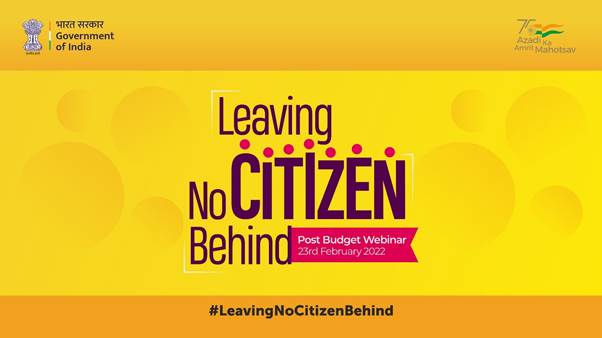Sunday 27 February 2022
Delivering hope: The Post as a humanitarian partner
Implementation strategy to ensure 100 percent core banking system for post offices
Ministry of Communications
Implementation strategy to ensure 100 percent core banking system for post offices discussed at Post-Budget webinar
Use of postal network for delivery of financial and banking services under aegis of Ministry of Rural Development also discussed
Post Budget Webinar on “Leaving No Citizen Behind” was organised yesterday. Budget announcement related to bringing 100 percent post offices on core banking system and interoperable post office account and its impact on the lives of rural poor especially women was discussed.

Prime Minister, Shri Narendra Modi addressed inaugural session of the webinar. The session on “Anytime Anywhere Banking Services and Interoperable Services through India Post” under “Assuring all rural poor especially women access to livelihood options and access to financial services” was chaired by Minister of Rural Development and Panchayati Raj, Shri Giriraj Singh. It was attended by experts from NITI Aayog and other agencies, and by a large section of people and stakeholders associated with post office schemes from different part of the country. Wide range of discussion took place on implementation strategy to ensure 100 percent core banking system along with deployment of interoperable service for post office accounts. The participants also discussed ways to explore possibilities of the use of postal network for delivery of financial and banking services under aegis of Ministry of Rural Development. Shri Ajit Pai, Distinguished Expert from NITI Aayog stressed that the post office can play a significant role in the area of credit, financial literacy and overall achievement of financial inclusion.
Department will prepare a detail roadmap to ensure timely implementation of the action items emerging out of the discussion in the webinar.
*****
Saturday 26 February 2022
Saturday 12 February 2022
PREVENTION OF SEXUAL HARASSMENT AT WORKPLACE
Ministry of Women and Child Development

PREVENTION OF SEXUAL HARASSMENT AT WORKPLACE
The Government of India has enacted ‘the Sexual Harassment of Women at Workplace (Prevention, Prohibition and Redressal) Act, 2013’ (SH Act) with the aim to provide safe and secure work environment to women. The Act is applicable to all women irrespective of their age or employment status, working in organised or unorganised sector. The Act casts an obligation upon all States to constitute Local Committees (LCs) in every district to receive complaints from organizations having less than 10 workers or if the complaint is against employer himself, for receiving complaints of sexual harassment at workplace.
The responsibility of implementation of the Act at State and District levels rests with the appropriate Government i.e. the respective State Governments in respect of all workplaces, which are established, owned, controlled or wholly or substantially financed by funds provided directly or indirectly by the State and any other workplace falling within its territory. They are responsible for monitoring the implementation of the Act and maintaining the data on the number of cases filed and disposed of. The data of State/ UT/ district-wise details of number of cases of sexual harassment filed and resolved is not maintained centrally. However, the National Crime Records Bureau (NCRB) compiles data regarding sexual harassment in work/ office premises (Section 354A of IPC) since 2017 in its publication namely 'Crime in India'. The published report is available till the year 2020, which is available at its website https://ncrb.gov.in.
The Act casts an obligation upon every employer to create an environment which is free from sexual harassment. For the purpose, employers are required to organize workshops, orientation and awareness programmes at regular intervals for sensitizing the employees and towards building the capacity of Internal Committee (IC) members around the provision of this legislation and display at any conspicuous place notice regarding the constitution of Internal Committee and penal consequences of sexual harassment etc.
To ensure effective implementation of the Act, a handbook and a training module have been developed. In addition, Ministry of Women and Child Development, from time to time, has issued advisories to all State Governments/ UT Administrations, Ministries/ Departments of Government of India and business associations/ chambers to ensure effective implementation of the Act. Video conferences have also been held with all State Governments/ UT administrations requesting them to establish and build capacity of LCs in each district of the country.
The Ministry has developed an online complaint management system titled the Sexual Harassment electronic–Box (SHe-Box, www.shebox.nic.in) for registering complaints related to sexual harassment of women at workplace.
On 31st July 2018, the Ministry of Corporate Affairs, at the request of this Ministry, has amended the Companies (Accounts) Rules, 2014 making mandatory the inclusion of a statement about compliance with the provisions relating to the constitution of IC under the SH Act in the Report of the Board of Directors.
The Department of Personnel and Training, Ministry of Personnel, Public Grievances and Pensions, Government of India has also issued advisories to all the Central Ministries/ Departments directing them to complete the inquiry in a time bound manner and to include the information related to number of cases filed under the SH Act and their disposal in their annual report.
This information was given by the Minister of Women and Child Development, Smt. Smriti Zubin Irani, in a written reply in Lok Sabha today.
















































